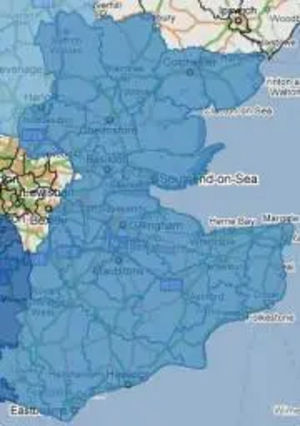Kent, Great Essex and East Sussex Local Enterprise Partnership: Where did THAT come from?

The Government has announced that it has asked a new Local Enterprise Partnership (LEP) covering "Kent, Great Essex and East Sussex" to come forward with firm proposals as one of 24 bids asked to progress their bids today. Kent County Council Tim Prater has expressed surprise that the proposals for a Kent and Medway LEP favoured by many local Councils and an Kent and Essex LEP promoted by Kent County Council Leader Paul Carter seem to have been rejected for the three county "Super-LEP".
The announcement of a new £1.4bn Regional Growth Fund and the first wave of 24 local enterprise partnerships that have been given the green light to come up with proposals for action was made today. The measures form part of a new approach to regional growth published today in the White Paper on Local Growth.
Kent County Councillor Tim Prater commented:
"I'm clearly delighted that Kent is part of the group that can now start formulating plans for developing business support and enterprise, and potentially getting support from the Regional Growth Fund. But the big question is where the support for a Kent, Greater Essex and East Sussex LEP has come from.
"There were initial plans for and Kent and Medway LEP which won support from a number of Kent local authorities. Then, at the last moment, Kent County Leader Paul Carter threw his support for a different Kent and Essex LEP. To find both of those proposals have been rejected and instead plans for a Three County Super LEP agreed seems a slap in the face for those who supported either of the two rejected bids, and most especially Paul Carter."
Commenting on the launch of the Regional Growth Fund, Deputy Prime Minister and Liberal Democrat Leader Nick Clegg said:
"For too long growth in the economy has been pinned on a few sectors, like financial services, while other great British industries have been ignored. Prosperity has been confined to certain postcodes while huge swathes of the country have suffered serial neglect.
"The Coalition Government is determined not to repeat these mistakes. We will support growth across the whole country, rewarding hard work and innovation in all of our industries. We understand that areas which rely on the public sector for jobs will need special help.
"Millions of people across Britain are being asked to bear their share of the difficult decisions needed to get the public finances in order. It's only fair that everybody benefits from future growth too.
"Crucially, spreading prosperity across the country also means giving local communities a greater say over how their money is raised and spent. That is why this Government is looking closely at ways of allowing local authorities to keep the business rates they collect."
Commenting further, Liberal Democrat Business Secretary Vince Cable said:
"I was delighted that so many of the proposals for local enterprise partnerships showed real imagination and initiative and a genuine desire to drive local economic growth. I am pleased to announce that we are asking 24 of these partnerships to set up their boards and get to work.
"The knowledge and expertise of the private sector, local authorities and their local communities will be crucial as we work to create a better environment for business and ensure that everyone has access to the opportunities that growth brings.
"The measures set out in today's White Paper demonstrate the Coalition's ambition to create a fairer and more balanced economy - one that is driven by private sector growth with business opportunities spread more evenly across the country and between industries."
The White Paper on Local Growth is available to download from http://www.bis.gov.uk/news/topstories/2010/Oct/local-growth The White Paper on Local Growth sets out the Government's new approach to rebalance the economy and drive sustainable growth by focusing on three key themes:
- Shifting power to local communities and businesses - by establishing dynamic local enterprise partnerships of local business and civic leaders, operating within an area that makes economic sense, which can provide the vision, knowledge and strategic leadership to set local priorities and empower communities to fulfil their potential.
- Increasing confidence to invest - by creating the right conditions for growth through a consistent and efficient framework for investment, an effective planning framework and new incentives to make sure local communities benefit from development.
- Focused investment - by tackling barriers to growth that the market will not address itself and supporting investment that will have a long term impact on growth.
The White Paper proposes that local enterprise partnerships will be able to consider a diverse range of roles, reflecting the differing local priorities in different areas, including:
- working with Government to set out key investment priorities, including transport infrastructure;
- coordinating proposals or bidding directly for the Regional Growth Fund;
- supporting high growth businesses, for example through involvement in bids to run the new growth hubs;
- participation in the development of national planning policy and ensuring business is involved in the consideration of strategic planning applications;
- lead changes in how businesses are regulated locally;
- strategic housing delivery, including pooling and aligning funding streams;
- working with local employers, Jobcentre Plus and learning providers to help local workless people into jobs;
- coordinating approaches to leverage funding from the private sector;
- exploring opportunities for developing incentives on renewable energy projects and Green Deal;
- involvement in the delivery of other national priorities such as digital infrastructure
In September the Government received 62 responses to its invitation to form local enterprise partnerships. Proposals covered every part of England outside London. Today 24 bids have been asked to progress their proposals to the next stage, they are:
- Birmingham & Solihull with E. Staffordshire, Lichfield &Tamworth
- Cheshire and Warrington
- Coast to Capital
- Cornwall & the Isles of Scilly
- Coventry & Warwickshire
- Cumbria
- Gt. Cambridge & Gt. Peterborough
- Greater Manchester
- Hertfordshire
- Kent, Greater Essex & East Sussex
- Leeds City Region
- Leicester & Leicestershire
- Lincolnshire
- Liverpool City Region
- Nottingham, Nottinghamshire, Derby, & Derbyshire
- Oxfordshire City Region
- Sheffield City Region
- Solent
- S.E. Midlands
- Stoke-on-Trent & Staffordshire
- Tees
- Thames Valley Berkshire
- The Marches
- West of England
A map of approved local enterprise partnerships is available from http://geocommons.com/maps/32888

Sign up
for email updates


